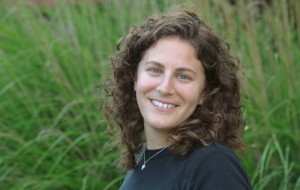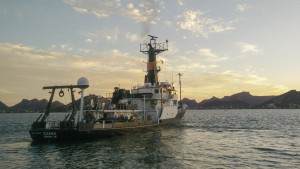
Tonight I will fly to Oregon to meet up with scientists from Oregon State University and embark on my first research cruise. I will be an observer aboard the R/V Oceanus, a mid-sized research vessel owned by the National Science Foundation and operated by OSU. We will be out on the ship for a week, traveling up and down the Pacific Northwest coast, and I’ll be blogging, taking pictures and shooting video to capture both the research being done and the experience of being aboard a research ship.
So how did this come about? I am the public information manager at AGU – we publicize new research published in AGU’s 19 scientific journals and presented at AGU meetings. In early February I attended a meeting with the editors of our journals and met Miguel Goni, an oceanographer at Oregon State University and Editor-in-Chief of Journal of Geophysical Research: Biogeosciences. He mentioned that his research team will have an extra spot on their upcoming research cruise, and asked me if I would like to tag along on the cruise to experience life at sea and help communicate the research being done. After figuring out a few logistics, I booked my flight to Oregon, stocked up on sea sickness patches and bought myself a set of heavy duty rain gear.
Goni and his colleagues are studying the coastal ocean off the Pacific Northwest in the winter to better understand the productivity of the ocean during this period and the role that small coastal rivers may play in driving this productivity. In ocean ecosystems, single-celled algae called phytoplankton use photosynthesis to produce organic matter that supports the food chain. Productivity refers to the production of this organic matter that influences the entire ocean food web.
The winter is generally seen as an unproductive period on the west coast. In the summer, winds drive nutrient-rich water from the deep ocean to the surface by a process called upwelling. These nutrients feed the phytoplankton that form the base of the ocean food chain. In the winter, the winds change and there is less upwelling along the west coast, leading scientists to believe there was very little productivity occurring.
But, scientists are now finding out that there is still production going on during the winter and they are trying to understanding what is driving it. The main focus of the research being done on the upcoming cruise is to study how pulses of freshwater and nutrients from the flooding of small coastal rivers, combined with the oceanographic processes of the ocean, could be influencing this winter productivity.
Understanding winter production in the coastal ocean – and the interaction between the land and the sea – could help scientists better understand how carbon cycles through the ocean, and the role that rivers play in that cycle. This includes understanding how nutrients coming from rivers in the winter might affect the entire marine ecosystem, including during the more productive summer months. Knowing the effect that rivers have on ocean productivity could become increasingly important, as scientists predict that climate change will cause wetter winters and increased flooding.
During the week-long cruise, the scientists will be deploying instruments to examine the ocean itself to understand how the water mixes, the currents move and how the water column is structured. They’ll also be sampling the water to find out what types of nutrients and organisms are in the water, and how productive these organisms are. I’ll be along capturing their work and learning about life on a research cruise. Follow along with me here and on our AGU social media channels: twitter, Facebook and Instagram. See you out on the ocean!
— Nanci Bompey is the public information manager for the American Geophysical Union. She is spending a week aboard the R/V Oceanus with scientists from Oregon State University who are studying the role that small rivers play in the productivity of the coastal ocean during the winter.





